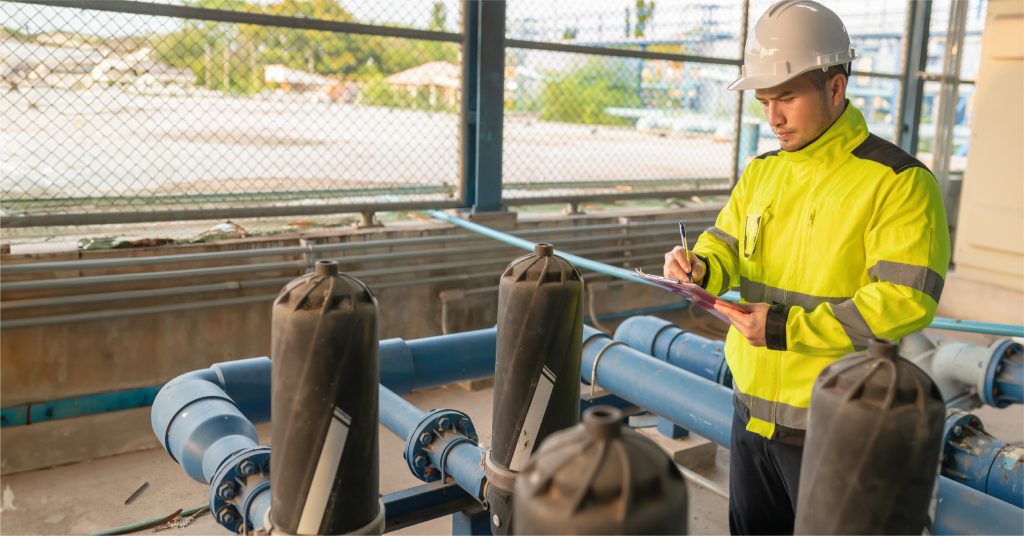Indonesia, a country abundant with natural water resources, faces significant challenges in providing clean and safe water to its growing population. Rapid urbanization, industrialization, and climate change have led to increasing levels of water contamination. To tackle this, the filtration process in water treatment plays a critical role.
This blog explores what filtration in water treatment is, its importance, and its applications in Indonesia’s water purification systems.
What Is Filtration in Water Treatment?
Filtration in water treatment is the process of removing suspended solids, impurities, and contaminants from water by passing it through a medium such as sand, gravel, or specialized membranes. This process ensures the water meets safety and quality standards for various applications, including drinking, industrial use, and irrigation.
The filtration process in water treatment involves physical, chemical, or biological mechanisms to separate contaminants. By removing sediments, bacteria, and other impurities, filtration enhances water quality and protects downstream equipment and systems from damage.
Importance of the Filtration Process in Water Treatment
Indonesia’s water supply systems are under pressure due to increasing demand and pollution. The filtration process in water treatment is vital for addressing these challenges and ensuring the availability of clean water for both urban and rural communities.
- Improved Drinking Water Quality
Filtration removes harmful microorganisms, sediments, and chemical pollutants from raw water, ensuring it is safe for human consumption. This is especially crucial in regions where access to potable water is limited. - Industrial Water Purification
Industries require high-quality water for processes like manufacturing, cooling, and boiler operations. Filtration in water treatment ensures that the water used in these processes is free from impurities that could damage machinery or affect product quality. - Agricultural and Irrigation Applications
In agricultural practices, clean water is essential for irrigation to ensure healthy crop growth. The filtration process in water treatment removes sediments and debris that could clog irrigation systems. - Wastewater Treatment and Reuse
As part of wastewater management, filtration helps remove contaminants from treated water, making it suitable for reuse in non-potable applications like irrigation and industrial cooling.
Types of Filtration in Water Treatment
The filtration process in water treatment can be categorized into several types, each suited for specific applications:
- Gravity Filtration
This involves passing water through a bed of sand or gravel under natural pressure. It is commonly used in municipal water treatment plants to remove large particles. - Pressure Filtration
Here, water is forced through a filtration medium under pressure. It is commonly used in industrial settings to achieve high filtration efficiency. - Membrane Filtration
This advanced filtration method uses semi-permeable membranes to remove even the smallest impurities, including bacteria and viruses. Membrane filtration is highly effective for drinking water purification and industrial processes. - Activated Carbon Filtration
Activated carbon filters are used to remove organic compounds, chlorine, and unpleasant tastes or odors from water. They are commonly used in residential and commercial water purification systems. - Multi-Media Filtration
This type of filtration combines multiple layers of materials, such as sand, gravel, and anthracite, to remove various types of contaminants effectively. It is often used in municipal water treatment systems.
Applications of Filtration in Water Treatment in Indonesia
The diverse needs of Indonesia’s water sector have led to the widespread adoption of filtration in water treatment across various sectors:
- Urban Water Supply
In major cities like Jakarta and Surabaya, filtration systems are used to treat raw water from rivers and reservoirs, ensuring safe drinking water for millions of residents. - Rural and Remote Areas
In rural Indonesia, small-scale filtration systems provide communities with access to clean water, reducing waterborne diseases and improving public health. - Industrial Sector
Industries in Indonesia, such as textiles, food and beverage, and power generation, rely heavily on filtration to meet their process water needs while adhering to environmental regulations. - Aquaculture and Fisheries
Indonesia’s thriving aquaculture industry uses filtration systems to maintain water quality in fish farms, ensuring healthy and sustainable seafood production. - Tourism and Hospitality
Hotels and resorts, especially in popular destinations like Bali and Lombok, use advanced filtration technologies to provide safe and clean water to guests, enhancing their overall experience.
Ion Exchange: Leading Innovations in Filtration Technology for Water Treatment
Ion Exchange Filters are categorized into pressure filters and gravity filters based on the method of water flow, either under pressure or by gravity, through the filter media. These filters utilize various materials, such as fine or coarse sand, anthracite, garnet, and granular activated carbon, as the filtering media.
- INDION Continuous Sand Filters features a unique continuous operation and automatic backwashing system. This makes them an excellent choice for water and wastewater treatment across a wide range of industries. The filters offer a compact and modular design, allowing for easy installation and maintenance, which enhances their suitability for various industrial applications. Their versatile applications include potable water treatment, industrial process water treatment, and tertiary wastewater treatment, offering flexibility across different sectors. These filters are commonly used in municipal water treatment to enhance water quality, in industrial settings to improve process water quality, and in wastewater treatment to facilitate tertiary treatment and nutrient removal.
- INDION Multigrade Filters Pressure offers an efficient solution with its high flow rates and consistent water quality. These filters are engineered to deliver superior filtration performance with a low-pressure drop, minimizing energy consumption and operational costs. Built with durable materials, they are designed to withstand challenging operating conditions, ensuring a long service life. They are versatile and find applications in several sectors, including industrial water treatment, municipal water purification, and desalination pre-treatment, making them a reliable choice for maintaining water quality standards in diverse environments.
- INDION New Generation Multigrade Filters (NGMF) series are designed to efficiently remove suspended solids and turbidity from feed water that has been coagulated and clarified. These filters can handle a maximum flow of 35 m³/h, making them suitable for various industrial applications. Aesthetically designed, lightweight, and easy to install, the NGMF series requires no special foundation, enhancing their versatility and appeal. Constructed from durable plastic materials, the pressure vessel is made of fiber-reinforced plastic (FRP), while the pipework is constructed from polyvinyl chloride (PVC), ensuring robust performance and longevity. The filters are equipped with a single multi-port valve operated by a hand lever for user-friendly operation. To maintain optimal performance, the filters feature a backwashing mechanism that reverses the flow whenever the pressure drop across the unit exceeds a specified limit, ensuring the system remains efficient and reliable over time.
- INDION Activated Carbon Filters are designed to effectively remove free residual chlorine (FRC) from feed water using granular activated carbon as the filter media. These filters are capable of treating feed water at flow rates of up to 170 m³/h. For specialized applications requiring the removal of odors, organic matter, and traces of oil, peat-based activated carbon with larger pores can be provided upon request. Key features of these filters include their compact design for easy installation and maintenance, tolerance to variations in chlorine levels, and built-in pressure gauges for monitoring. The filters are ideal for use in demineralizing and reverse osmosis units and for the removal of contaminants, making them versatile solutions for various industrial applications.
Conclusion
The filtration process in water treatment is a cornerstone of Indonesia’s efforts to provide clean water for its people and industries. By understanding what filtration in water treatment is and leveraging the latest technologies, the country can address its water challenges effectively and sustainably.


